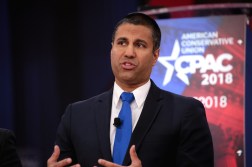FCC’s plan to dismantle net neutrality rules raises serious concerns for educators

The Federal Communications Commission (FCC) is presenting a plan to eliminate federal net neutrality protections — a move that many educators and technology advocates fear will impair online learning and students’ access to certain educational resources.
The existing policies on net neutrality were established under President Barack Obama in 2015 and require internet service providers (ISPs) to treat web content equally, preventing the creation of fast or slow lanes for streaming.
FCC Chairman Ajit Pai — a Republican and strong critic of the Obama-era net neutrality policies — released the official proposal to eliminate net neutrality last week and is now allowing three weeks of public comments and review before the Commission votes on Dec. 14.
“Under my proposal, the federal government will stop micromanaging the Internet,” Pai said in a statement. “Instead, the FCC would simply require internet service providers to be transparent about their practices so that consumers can buy the service plan that’s best for them and entrepreneurs and other small businesses can have the technical information they need to innovate.”
However, the Consortium for School Networking (CoSN), made up of K-12 technology leaders, is concerned about the consequences this plan will have on the American education system.
In a statement issued Tuesday, Keith Krueger, CEO of CoSN, challenged Pai’s proposal, called it “aggressive” and questioned how the higher transport costs imposed on digital content providers would affect school districts’ expenses.
“Simply relying on carriers to disclose information about pricing and practices would be a flimsy guardrail for powerful [ISPs], especially for smaller, rural and high-cost districts that lack competition and meaningful market power,” Krueger said.
Additionally, Krueger acknowledged his misgivings about how tiered pricing and internet fast lanes would hinder new entrants to the edtech market and asked what the government would do to protect startups in a system that is structured to benefit “better-resourced incumbents.”
The American Library Association also rejects Pai’s proposal. In a statement, ALA president Jim Neal noted that eliminating the current net neutrality rules would seriously harm K-12 libraries, which rely on the uninhibited flow of educational resources.
“Preserving net neutrality is essential for equitable access to online information and services and thus a vital concern for our nation’s libraries,” Neal said in a statement. “Now that the internet has become the primary mechanism for delivering information, services and applications to the general public, it is especially important that commercial [ISPs] are not able to control or manipulate the content of these communications.”
The new net neutrality proposal is even facing strong opposition within the FCC.
Commissioner Jessica Rosenworcel — a Democrat and longtime advocate for open edtech resources — spoke out against the proposal, which she referred to as “offensive” and “ridiculous.”
“Our internet economy is the envy of the world because it is open to all. This proposal tears at the foundation of that openness,” Rosenworcel said. “It hands broadband providers the power to decide what voices to amplify, which sites we can visit, what connections we can make, and what communities we create.”



